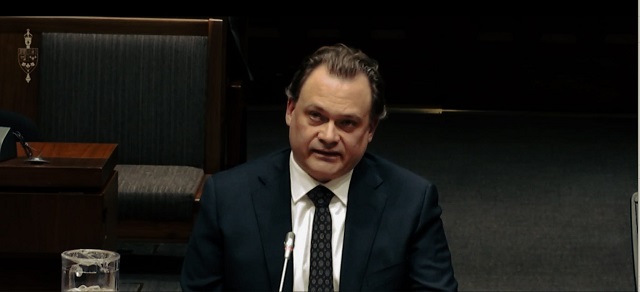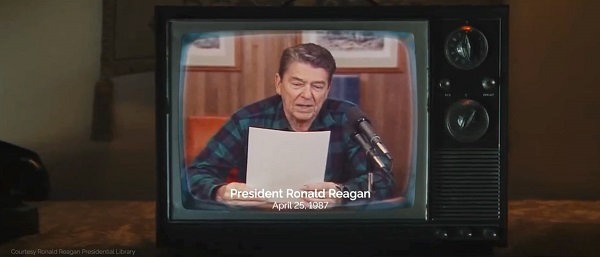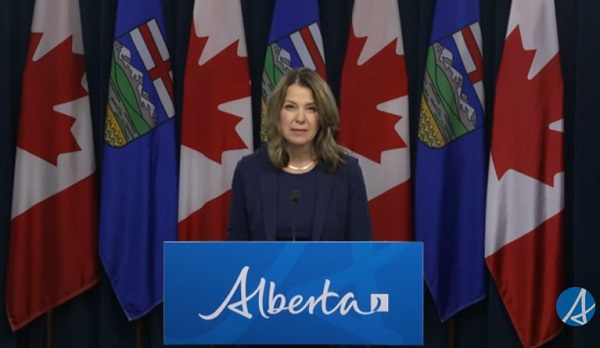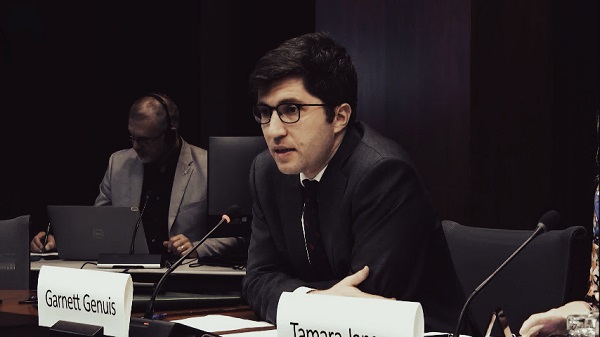National
CBSA Union president – ArriveCan wasn’t needed

PACP’s Meeting No. 105 sheds light on the profound inefficiencies plaguing the Trudeau administration, as Mark Weber testifies on the ArriveCan’s failures and the cultural rot within the CBSA
In the latest episode of the ongoing saga that encapsulates the depth of dysfunction under the Trudeau administration, Meeting No. 105 of the PACP – Standing Committee on Public Accounts unfolded in what can only be described as a monumental barn burner. The spotlight shone intensely on Mark Weber, the resolute President of the Customs and Immigration Union, who took the stand to expose the underbelly of inefficiency and mismanagement festering with the ArriveCan from the perspective from his members on the ground.
In a testament to the burgeoning controversy, Weber’s testimony sliced through the facade of bureaucratic efficiency, laying bare the consequences of a government more concerned with image than substance. The ArriveCan debacle, with its spiraling $60 million expenditure, stands as a glaring symbol of the Trudeaus approach: reckless spending which is severely lacking accountability.
The session was a spectacle of irony and disarray that bordered on the comedic, as the theater of government dysfunction unfolded before our very eyes. Amidst the turmoil, Liberal MP Brenda Shanahan stood up, emblematic of the coalition’s unwavering detachment from reality, posing the question to Mark Weber:
“Can you please tell us what you have heard from your union members in terms of how ARRIVE can provide efficiencies to the previous paper-based system?”
Before diving into Weber’s response, it’s crucial to note the backdrop against which this farce was set. Here we had the Liberal party, clinging with desperate fingers to the thin reed of “efficiency,” as if this single word could magically overshadow the colossal sum of $60 million funneled into the abyss for an app that, as it turns out, was about as necessary as a screen door on a submarine.
Mark Weber’s response was as pointed as it was illuminating, a stark contrast to the fluff and bluster we’ve come to expect from the powers that be.
“In terms of the information that we needed for our purposes for customs officers, really all we needed was to be able to verify that the person was vaccinated, which everyone was able to do simply by showing us their vaccination on their phone or a printed-out copy.”
There it was, the moment of truth – the revelation that the taxpayer, the everyday Canadian, had been bilked out of $60 million for a redundant app, an app that wasn’t even a requirement in the practical conduct of our border security.
Weber then laid bare the operational fiasco that was the app’s implementation. The hours squandered on the ground, the bureaucratic hoops jumped through for information that seemed to serve no one, certainly not the Canadian public.
“It seemed like we were spending our time collecting information for others that in large part we don’t know or don’t think was used,”
he dissected mercilessly. And then came the kicker, the detail that should make every Canadian’s blood boil:
“As far as I know, no one verified where anyone was staying. You know, the hundreds of hours that our officers spent helping people collect this information at the border we don’t believe was really used at all.”
Mark was probed about another critical aspect: the training—or lack thereof—that his union members received on the proper use of the ArriveCan app. With a shake of his head, Mark’s response was disheartening but unsurprising. The training was minimal, leaving border guards underprepared and travelers equally bewildered. This lack of instruction exacerbated an already tense situation, pitting frustrated travelers against equally frustrated border personnel, a recipe for chaos and inefficiency at our nation’s gateways.
Mark didn’t stop there. He acknowledged that while technology can be a powerful ally, it is not a panacea for all woes. He underscored a fundamental truth: an app is merely a tool, and like all tools, its effectiveness is contingent upon the skill and expertise of those wielding it. In the realm of national security and border control, this means boots on the ground—trained, knowledgeable personnel ready to act. Mark stressed that despite the high hopes pegged on technological advancements like automated passport checkouts, these innovations have not significantly reduced wait times at airports. The anticipated streamline and efficiency, much vaunted by proponents of the app, have yet to materialize in any tangible form.
This situation leaves us with a glaring juxtaposition: on one side, a government heralding the dawn of a new, tech-savvy era in border management; on the other, the stark reality of frontline workers grappling with underpreparedness and ineffective tools. The mismatch between the glittering ideal and the gritty reality underscores a profound disconnect.
Mark painted a picture of an organization beset by inefficiency and bureaucratic bloat. He described a surreal scenario where the hierarchy was so top-heavy that there were instances of four superintendents tasked with supervising merely two employees. This, he argued, was indicative of a toxic culture that not only hampered operational effectiveness but also left little room for accountability.
More alarmingly, Mark highlighted a significant gap in the organization’s framework: the lack of whistleblower protection. This absence of safeguards for those willing to speak out against malpractices further entrenched the culture of silence and complicity, stifling any potential for reform or improvement from within.
In response to these criticisms, the Liberals and NDP, now bound in a coalition, deflected by invoking the specter of the Harper era, suggesting that the policies instituted during his tenure continued to cast a long shadow over the CBSA. However, this attempt to pivot away from current issues falls flat. The reality is, with the power and mandate to govern, the coalition could have engaged with the union or the CBSA long ago to address and reverse any contentious Harper-era policies. Yet, they chose inaction.
My fellow Canadians, as we close this chapter, let’s reflect on a critical issue that has metastasized within our public institutions—a malignancy that threatens the very integrity of our governance: the lack of whistleblower protection.
This deficiency, a silent but deadly cancer, undermines the moral and operational foundation of our services. When our dedicated public servants, those tasked with safeguarding the public good, stand muted, crippled by the fear of reprisal, we face a grave crisis. How can we expect improvement or rectitude within our systems if those witnessing wrongdoings remain shackled by fear? A system that stifles the courageous voices calling out corruption or malpractice is a system that has failed its people.
Consider the case of Luc Sabourin, a former employee of the CBSA. His experience is a stark illustration of this systemic failure. Sabourin spoke out, did his civic duty by reporting wrongdoing within his organization. But what reward did his honesty fetch? Bullying, ostracization, and a clear message: silence is safer than integrity. This is the dire consequence of a system that fails to shield its truth-tellers.
This, my fellow Canadians, is unacceptable. It’s high time we demand more than just superficial changes and empty promises from the Liberals and the NDP. Mere band-aid solutions and deflections to past administrations will not heal the deep-seated issues within our governance. The controversies swirling around instruments like ArriveCan and the toxic culture within the CBSA demand rigorous scrutiny, not mere sidestepping or finger-pointing. The swamp of corruption and malaise within our government requires draining, not mere change of guards or partisan rhetoric. Pierre Poilievre and his team, along with every conscientious lawmaker and citizen, must grab their metaphorical shovels. It’s time to excavate the entrenched bog of mismanagement and cleanse the festering wound of corruption that plagues our country.
Let this be a call to action: a plea for transparency, accountability, and genuine reform. For the health of our democracy, for the integrity of our institutions, and for the well-being of every Canadian, the time to act is now. Let’s unite in this critical endeavor to rejuvenate our system, to transform it into one that truly serves, protects, and represents us all.
For the full experience subscribe to The Opposition with Dan Knight .
Business
‘TERMINATED’: Trump Ends Trade Talks With Canada Over Premier Ford’s Ronald Reagan Ad Against Tariffs


From the Daily Caller News Foundation
President Donald Trump announced late Thursday that trade negotiations with Canada “ARE HEREBY TERMINATED” after what he called “egregious behavior” tied to an Ontario TV ad that used former President Ronald Reagan’s voice to criticize tariffs.
The ad at the center of the feud was funded by Ontario Premier Doug Ford’s government as part of a multimillion-dollar campaign running on major U.S. networks. The spot features Reagan warning that tariffs may appear patriotic but ultimately “hurt every American worker and consumer.”
Dear Readers:
As a nonprofit, we are dependent on the generosity of our readers.
Please consider making a small donation of any amount here.
Thank you!
“They only did this to interfere with the decision of the U.S. Supreme Court, and other courts. TARIFFS ARE VERY IMPORTANT TO THE NATIONAL SECURITY, AND ECONOMY, OF THE U.S.A,” Trump wrote on his Truth Social platform late Thursday. “Based on their egregious behavior, ALL TRADE NEGOTIATIONS WITH CANADA ARE HEREBY TERMINATED.”
Ford first posted the ad online on Oct. 16, writing in a caption, “Using every tool we have, we’ll never stop making the case against American tariffs on Canada. The way to prosperity is by working together.”
The Ronald Reagan Presidential Foundation and Institute criticized the ad Thursday evening, saying it “misrepresents” Reagan’s 1987 radio address on free and fair trade. The foundation said Ontario did not request permission to use or alter the recording and that it is reviewing its legal options.
The president posted early Friday that Canada “cheated and got caught,” adding that Reagan actually “loved tariffs for our country.”
The ad splices audio from Reagan’s original remarks but includes his authentic statement: “When someone says, ‘let’s impose tariffs on foreign imports’, it looks like they’re doing the patriotic thing by protecting American products and jobs. And sometimes, for a short while it works, but only for a short time.”
Reagan also noted at the end of his remarks that, in “certain select cases,” he had taken steps to stop unfair trade practices against American products and added that the president’s “options” in trade matters should not be restricted, which the ad did not include.
Since returning to the White House, Trump has imposed tariffs on Canadian aluminum, steel, automobiles and lumber, arguing they are vital to protecting U.S. manufacturing and national security.
The Supreme Court is set to hear arguments in November over whether the administration overstepped its authority by invoking the International Emergency Economic Powers Act to impose reciprocal tariffs on dozens of nations, including Canada. Tariffs on commodities such as steel, aluminum and copper were implemented under Section 232 of the Trade Expansion Act and are not currently being challenged, as they align with longstanding precedent established by prior administrations.
Thursday’s move marks the second time this year Trump has canceled trade talks with Ottawa. In June, he briefly halted discussions after Canada imposed a digital services tax on American tech firms, though the Canadian government repealed the measure two days later.
Business
A Middle Finger to Carney’s Elbows Up

Elbows Up Stengthens U.S. Tariff Resolve at Canada’s Expense
The disastrously misguided “Elbows Up” campaign championed by the Carney government rooted in the fantasy that a smug, arrogant Liberal elite wields leverage over the largest economy in human history, has suffered yet another devastating blow. The latest fallout: U.S.-based truck manufacturer Paccar Inc., maker of iconic heavyweights such as Kenworth and Peterbilt, is slashing Canadian production and laying off hundreds of workers in anticipation of a 25-per-cent U.S. import tariff set to take effect next month.
Employees at Paccar’s Sainte-Thérèse, Quebec plant were informed Wednesday that the company will move production of trucks destined for the U.S. market back to its American facilities. According to Daniel Cloutier, Quebec director for Unifor, approximately 300 jobs will be eliminated, leaving roughly 500 workers at the plant.
Honking for Freedom Substack is a reader-supported publication.
To receive new posts and support my work, consider becoming a free or paid subscriber.
“They will continue building trucks for the Canadian market,” Cloutier said, noting that domestic demand represents a much smaller portion of output. At its peak, the plant produced 96 trucks per day; production will now drop to just 18 units daily. That is an 81% drop.
Paccar declined to confirm the restructuring or provide additional details. However, in a financial earnings call a day earlier, CEO Preston Feight described the U.S. tariff policy as advantageous for the company. “I think it helps Paccar significantly,” Feight said. “It gives us a competitive leg up from where we’ve been.”
U.S. Tariffs Driving Industry Shift
U.S. President Donald Trump has confirmed that all medium and heavy-duty trucks imported into the United States will face a 25-per-cent tariff beginning Nov. 1, along with an additional 10-per-cent duty on buses. The tariffs are being imposed under Section 232 of the Trade Expansion Act, which targets imports deemed to pose a national security risk.
These measures follow earlier tariffs that have already struck Canadian steel, aluminum, automobiles, copper, and lumber, forcing companies to shelve investments and reconsider their North American strategies.
Broader Auto Sector Retrenchment
Other automakers are also pulling back production in Canada. General Motors announced Tuesday it is ending production of the Chevrolet BrightDrop electric delivery van in Ingersoll, Ontario, costing over 1,100 workers their jobs. Stellantis recently confirmed plans to shift production of the Jeep Compass from Brampton, Ontario, to Belvidere, Illinois, as part of a strategy to increase U.S. output by 50 per cent by 2029.
Quebec Plant at Risk
The Sainte-Thérèse plant, which manufactures Class 5, 6 and 7 Kenworth and Peterbilt trucks, has already endured two rounds of layoffs over the past year as uncertainty around tariffs weakened demand. At peak production, the facility employed over 1,400 people.
Cloutier said the union is pressing both the Quebec and federal governments to prioritize the purchase of domestically made vehicles to sustain production levels. Without such measures, he warned, the plant could be forced to close due to high fixed costs and insufficient volume. “Let’s not pretend global trade hasn’t changed with this President,” Cloutier said. “We need to stop twiddling our thumbs.”
Bus Manufacturers Also Exposed
Quebec is also home to two major bus manufacturers, Prevost and Nova Bus, both owned by Volvo Group that could face similar challenges due to new tariffs on buses entering the U.S. Executives at both companies say they are still assessing the impact of the policy shift.
What can we learn from all this?
Perhaps our deep reliance on American innovation has consequences we have been unwilling to confront. The warning signs were evident well before Donald Trump’s election. He was explicit that tariffs would be used as a strategic tool to financially incentivize American companies to return to the United States. This was not hidden, it was a core pillar of his economic agenda.
I have said repeatedly on the Marc Patrone Show on Sauga 960 that my frustration is not with America’s strategy, but with Canada’s political class. Their smug arrogance lies in the belief that, as great as Canada can be, we could somehow dominate the greatest economy in the history of civilization rather than work with it. The Trump administration never wanted Canada to become the 51st state; they want our valuable resources and are willing to pay fair value for them, and they expect Canada to finally take our internal security threats seriously; something I have personally presented on in the United States. Yet instead of leveraging our strategic position, Canada’s leadership chose performative resistance over pragmatic partnership.
The most telling moment came when President Trump reportedly asked Justin Trudeau what would happen if the United States imposed a 25-per-cent tariff on all Canadian goods. Trudeau’s response, “It would destroy Canada” was an example of catastrophic stupidity. It handed Trump the gun he could use to execute Canada economically and perhaps cost Canada its sovereignty over the long term.
Reminiscent of the scene from The Hunt for Red October, when Captain Tupolev, in an act of smug Laurentian style arrogance, fires a torpedo at Ramius only for it to circle back and destroy his own submarine, a catastrophic miscalculation born of arrogance and a complete misunderstanding of the enemy’s capabilities. A catastrophic miscalculation that mirrors Elbows Up stupidity.
Order Now!
Honking For Freedom – The Trucker Convoy That Gave Us Hope HonkingForFreedom.com
Twitter | Locals | Rumble | Instagram
www.BenjaminjDichter.com
Audio
Freedom Coffee Podcast
Honking for Freedom Substack is a reader-supported publication.
To receive new posts and support my work, consider becoming a free or paid subscriber.
-

 Business1 day ago
Business1 day ago$15B and No Guarantees? Stellantis Deal explained by former Conservative Shadow Minister of Innovation, Science and Technology
-

 Agriculture1 day ago
Agriculture1 day agoFrom Underdog to Top Broodmare
-

 Alberta20 hours ago
Alberta20 hours agoPremier Smith moves to protect Alberta in International Agreements
-

 Business15 hours ago
Business15 hours agoLiberals backtrack on bill banning large cash gifts, allowing police to search Canadians’ mail
-

 Health15 hours ago
Health15 hours agoFor Anyone Planning on Getting or Mandating Others to Get an Influenza Vaccine (Flu Shot)
-

 Alberta2 days ago
Alberta2 days agoAlberta’s licence plate vote is down to four
-

 Bruce Dowbiggin2 days ago
Bruce Dowbiggin2 days agoIs The Latest Tiger Woods’ Injury Also A Death Knell For PGA Champions Golf?
-

 Sports14 hours ago
Sports14 hours ago‘We Follow The Money’: Kash Patel Says Alleged NBA Ties To Mafia Just ‘The Start’ Of FBI Investigation








